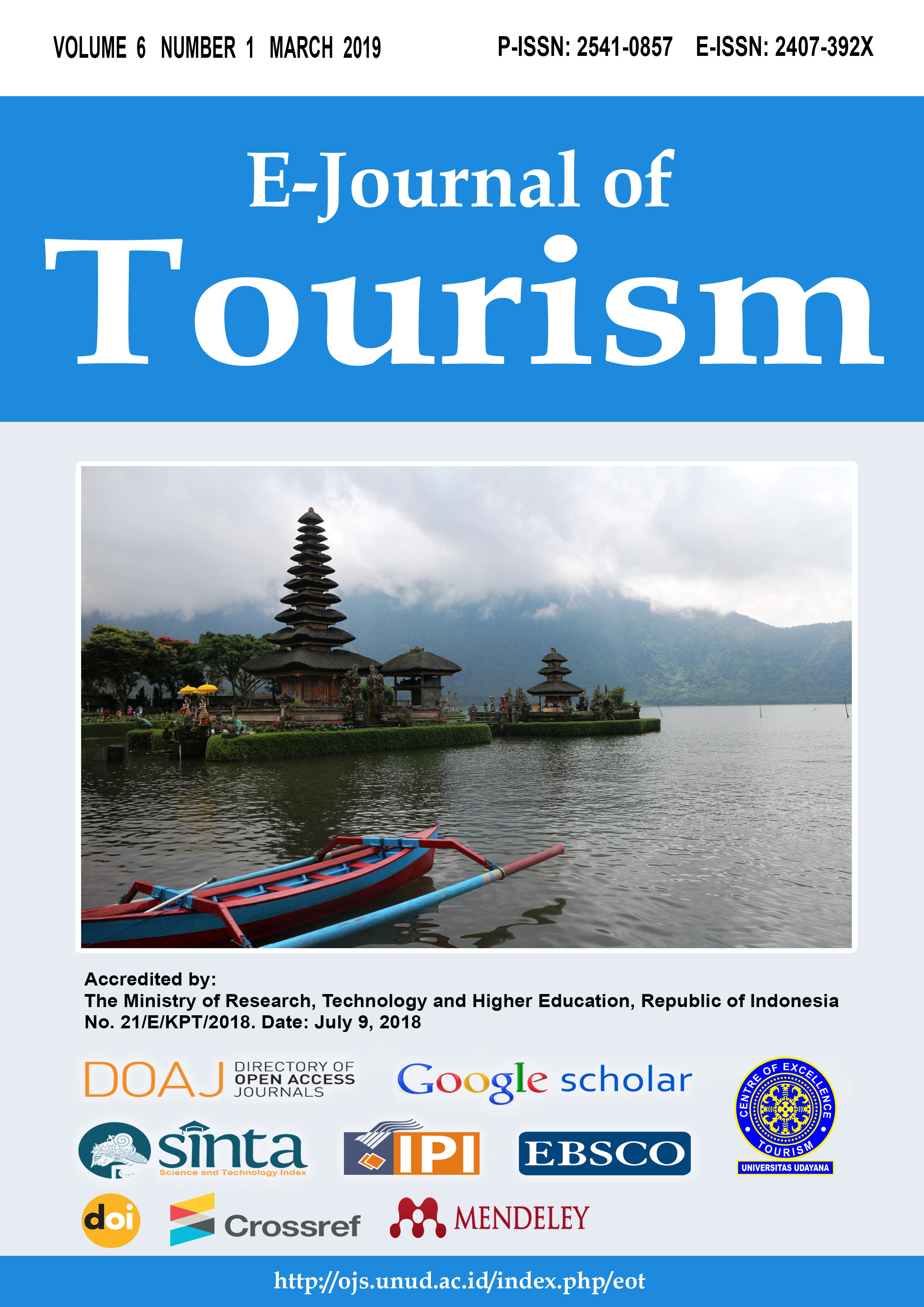Reading Anomaly of Tourist Satisfaction in Pilgrimage Tourist Destination of Sunan Muria Tomb, Kudus, Central Java
Abstract
Satisfaction of tourists is the key success for tourism destination sustainability because it is a reason for tourists to return to the destination. This research wanted to see the anomaly at Sunan Muria Tomb, Kudus, Central Java related to the satisfaction of tourists on the limited accessibility which is one of the four components that must be owned by a tourist destination according to Cooper, et.al. (1993), in addition to attractions, amenitas, and ancillary service. This research uses descriptive qualitative method and phenomenological approach. Methods of data collection with field observation, in-depth interviews and literature study. The results of this study indicate that access to the tomb of Sunan Muria, both with the stairs and motorcycle taxi is still far from feasible. The stairs are not flat because it is made of stone times, quite steep and there is no cover on so if the rain down the stairs become muddy and slippery. Although there is motorcycle taxi service, but the level of security (riding safety) is also low. This destination for tourists still has interesting attractions as pilgrimage destination with adequate amenitas (food stalls and lodgings) and ancelery service (from the YM2SM or Sunan Muria foundation and the Tourism Office of Kudus District Government), although accessibility is very problematic. All the visitors complained about this, but that did not dampen interest for a return visit. This is an anomaly in the Sunan Muria pilgrimage destination.
Downloads
References
Barsky, J.D (1992) Customer satisfaction in the hotel industry: meaning and measurement. Hospitality Research Journal, 16(1): 51-73.
Cooper, C., Fletcher, J., Gilbert, D., and Wanhill, S (1993), Tourism: principle and practice. Longman Scientific & Technical. Harlow.
Chambert Loir and Guillot (2010). Ziarah dan wali di dunia Islam. Depok: Komunitas Bambu.
Damanik, J dan Weber, H (2006). Perencanaan ekowisata dari teori ke aplikasi. Yogyakarta: PUSPAR UGM dan Andi.
Fornell, C (1992). A national customer satisfaction barometer: the swedish experience. Journal of Marketing, Vol. 56
Hasyim, U (1983) Sunan Muria antara fakta dan legenda. Kudus: Menara Kudus.
Kotler P and Koller KL (2008). Manajemen Pemasaran Jilid 2. Jakarta: Erlangga.
Libison and Muraleedharan (2008) Economic benefits of pilgrimage tourism: a case study of Sabarimala pilgrimage with special reference to Pandalam rural locality in Kerala (India). South Asian Journal of Tourism and Heritage Vol.1, No. 1, pp. 57-64, 2008.
Mulyana, S. (2008) Runtuhnya kerajaan Hindu-Jawa dan timbulnya negara-negara Islam di nusantara. Yogyakarta: LKiS.
Peraturan Pemerintah Republik Indonesia Nomor 50 Tahun 2011 [Government Regulation of the Republic of Indonesia Number 50 Year 2011]
Prihantoro F and Yuristiadhi G (2018). Behavior of tourists and the future of middle class tourism: a phenomenological study of sunan giri and sunan drajat tombs. Conference Paper. The 1st International Conference on South East Asia Studies (ICSEAS 2016). KnE Social Sciences.
Raj, R and Griffin, K (2015) Religious tourism and pilgrimage management: an international perspective, Published Wallingford, Oxfordshire, UK; Boston, MA: CABI.
Salam, S. (1974) Sekitar wali songo. Kudus: Menara Kudus.
Tjiptono and Diana (2015) Pelanggan Puas? Tak Cukup. Yogyakarta: Andi.
Vijayanand. (2012). Socio-economic impacts in pilgrimage tourism. International Journal of Multidisiplinary Research 2 (1): 329–343.
Widodo, Sutejo K., Alamsyah, Indrahti, Sri, Maziyah, Siti, dan Amaruli, Rabith Jihan (2016). Sunan muria today. Semarang: Tigamedia Pratama.
Wuryono, W (2014) Napak pemikiran Sunan Muri: dari ekoreligi hingga akidah muttahidah. Kudus: Pondok Pesantren Darul Falah.

This work is licensed under a Creative Commons Attribution 4.0 International License.
The copyright of the received article shall be assigned to the journal as the publisher of the journal. The intended copyright includes the right to publish the article in various forms (including reprints). The journal maintains the publishing rights to the published articles.




















